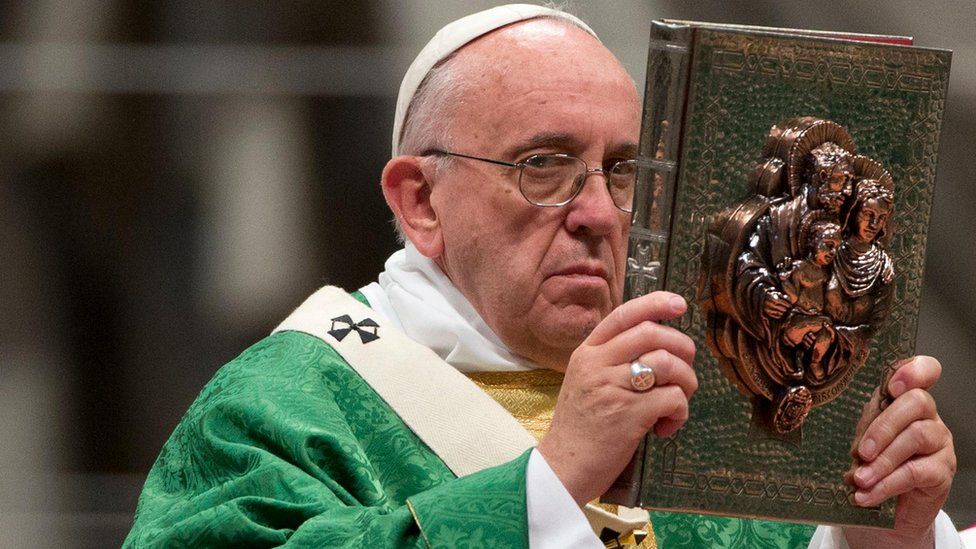Pope Francis opens Roman Catholic synod amid gay row
- Published

Pope Francis has celebrated Mass at St Peter's Basilica in the Vatican, at the start of a synod of Roman Catholic bishops focusing on family issues.
The run-up was dominated by a row over a Vatican priest who on Saturday announced he was in a gay relationship.
Poland-born Krzysztof Charamsa said he wanted to challenge the Church's "backward" attitude to homosexuality.
He was later dismissed from his post at the Vatican's office in charge of guarding Roman Catholic doctrine.
A Vatican spokesman said Monsignor Charamsa's decision to give interviews on the eve of the synod was "grave and irresponsible" and would put Pope Francis under "undue media pressure".
Krysztof Charamsa says he wants to challenge the Church's "backwards" attitude to homosexuality
In an interview with the Corriere Della Sera newspaper, the 43-year-old priest said: "It's time the Church opened its eyes and realised that offering gay believers total abstinence from a life of love is inhuman."
The controversy has set the scene for what some fear could be a fractious three weeks, says BBC religious affairs correspondent Caroline Wyatt.
Almost 300 Church leaders - and some lay people - will be discussing such issues as the treatment of Catholics who are gay, and how to approach couples who live together without being married or wish to take communion after being divorced.
Analysis: Caroline Wyatt, BBC News
It is the most highly-anticipated meeting of the leaders of the Roman Catholic church since the Second Vatican council, some 50 years ago.
In his homily today, the Pope spoke of the importance of the family - and perhaps rather pointedly, of the love between a man and a woman. He also said that the wealth of the developed world hadn't led to greater happiness, but to loneliness, and higher rates of abortion and divorce.
Many campaigners and more liberal Catholics would like to see a change in Catholic doctrine on issues ranging from homosexuality to contraception.
But while some bishops here do want reform, others remain fiercely opposed. In the end, though, the synod is not a democracy. It will be up to the Pope to decide what - if anything - changes, and how the Church applies its teaching to its sometimes errant flock.
The Pope has called for a more understanding attitude on sexual issues.
After his election in 2013, Pope Francis reaffirmed the Roman Catholic Church's position that homosexual acts were sinful, but said homosexual orientation was not.
"If a person is gay and seeks God and has good will, who am I to judge?" he said.
The issue of homosexuality was also highlighted during the Pope's visit to the US last week.
He had a private meeting with a gay former student of his and his boyfriend at the Vatican mission in Washington.
The Pope also met Kim Davis, a Kentucky local official who recently gained attention for refusing to issue marriage licences to same-sex couples.
- Published3 October 2015
- Published2 October 2015
- Published30 September 2015
- Published22 September 2015